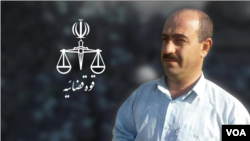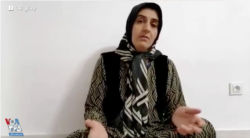One of the Iranian lawyers representing a minority Kurdish political prisoner facing execution in Iran has reportedly asked for a retrial to overturn the man’s death sentence, which supporters say was unjustly based on forced confessions.
In a Tuesday interview with VOA Persian, a source with knowledge of the situation said the lawyer submitted the request for a retrial of Heydar Ghorbani to Iran’s judiciary in response to an August 6 ruling in which the Iranian Supreme Court upheld Ghorbani’s death sentence. VOA has not named the lawyer cited by the source at the source’s request. Iran has a record of harassing citizens who speak to Western-based media outlets that it deems hostile.
Ghorbani was arrested in October 2016 in Iranian Kurdistan’s Kamyaran County and charged in connection with a violent incident there in the previous month involving the killings of three members of Iran’s top military force, the Islamic Revolutionary Guard Corps.
In the following years, rights activists reported that Iranian authorities sentenced Ghorbani to death on charges of collaborating in an armed attack that killed the IRCG personnel and being a member of the outlawed Democratic Party of Iranian Kurdistan rebel group. During the period, Iranian state-run network Press TV aired a 2017 program titled The Death Driver, in which Ghorbani seemingly confessed to having driven the DPIK rebels involved in the killings.
Amnesty International has said Ghorbani is one of several minority Kurds persecuted by Iranian authorities for “real or perceived affiliation with armed Kurdish political opposition groups.” Those Kurds were sentenced to death following what the group has called “grossly unfair trials that relied primarily or exclusively on confessions obtained without the presence of a lawyer and under torture and other ill-treatment.”
The source who spoke to VOA said the Iranian Supreme Court’s August 6 action entitles authorities in Iranian Kurdistan’s provincial capital of Sanandaj to carry out Ghorbani’s execution. However, the source said the ruling also gave Ghorbani's lawyer access to the case files for the first time, showing the lawyer that the entire verdict was based on what Ghorbani’s supporters have said were forced confessions.
“Ghorbani has never admitted to being armed or being a member of the Democratic Party of Iranian Kurdistan,” the source said. Ghorbani’s lawyer requested the retrial citing the lack of evidence besides the apparent forced confessions, the source added.
Article 477 of Iran’s Code of Criminal Procedure gives Iran’s judiciary chief the power to order the Supreme Court to overturn a verdict that he deems to be “evidently in contravention of Sharia [Islamic law]” and issue a new one.
There have been no references to Ghorbani’s case or his lawyer’s reported retrial request in Iranian state media in recent days.
In a video shared with VOA Persian and published Tuesday, Ghorbani’s wife Sharareh Sadeghi reiterated her belief in his innocence, saying he had been tortured into confessing.
“I call on the Iranian people, relevant authorities, the people of the world and international organizations to respond to the upheld death sentence of my husband by stopping Iranian security forces from depriving my children of having a father,” Sadeghi said.
She also identified one member of her husband’s legal team as Morteza Javanmardi. No recent comments from him about the case could be found online.
In an August 3 message on the case of another Iranian Kurd at risk of execution, Amnesty International said statements elicited as a result of torture, ill-treatment or other forms of coercion “must be excluded as evidence in criminal proceedings, except those brought against suspected perpetrators of such abuse.”
“In view of the irreversible nature of the death penalty, the proceedings in capital cases must scrupulously observe all relevant international standards protecting the right to a fair trial,” the group added.
This article originated in VOA’s Persian Service. Click here for the original Persian version of the story.





